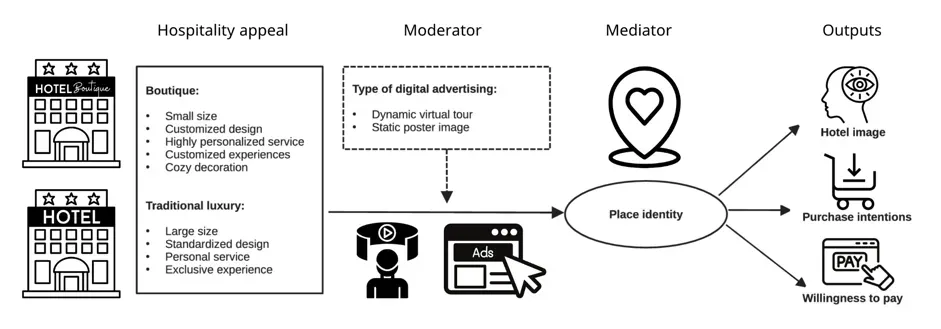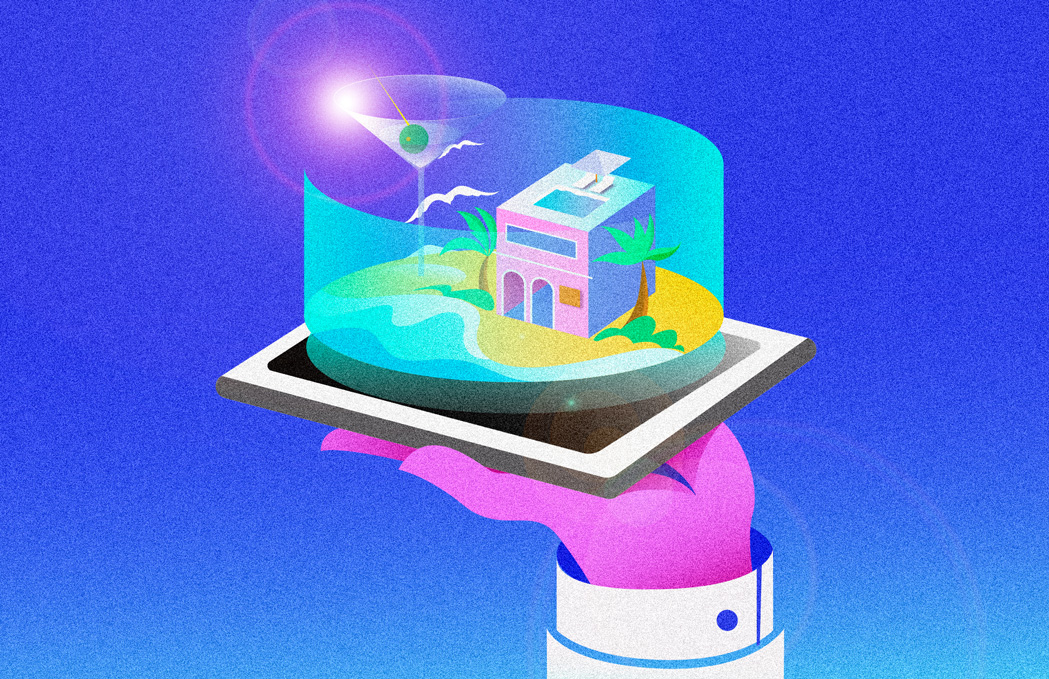Imagine that you are looking for a place to stay. You are focused on finding the best option. Suddenly, you find an offer from a hotel that catches your attention…what factor made you focus on this option? What makes a place to stay attractive? What characteristics of a service generate positive attitudes towards the brand image, greater purchase intention and willingness to pay? What type of advertising is effective? In our collaborative research project, we delve into boutique concepts and how different types of advertising can create a greater sense of place for customers.
The Boutique concept in the service industry
The service industry in general is highly competitive, and specifically in the hospitality industry, the boutique concept was born as a form of differentiation. It is understood as an intimate, luxurious and exclusive service environment, rich in aesthetic and innovative designs; it offers unique experiences to customers by facilitating memorable identity connections. Today, more than 5,000 boutique hotels employ nearly 150,000 people in the US; and the concept has gained particular interest during the COVID-19 pandemic, with a growth forecast of 18% (IBISWorld, 2021). Although the boutique concept is generally associated with hotels, it is also applied in various sectors of hospitality, such as boutique restaurants, catering services, travel agencies and culinary tourism. These types of services are appropriate for customers who respond more favorably to emotional advertising appeals compared to rational ones, which indicates that these customers value the offering’s relational, experiential, aesthetic and hedonic aspects over its merely functional ones.
Our findings are now published in the article "Elevating the boutique appeal: generating a sense of place in luxury hospitality through virtual tours," available in the journal Consumer Behavior in Tourism and Hospitality.
Sense of place and customer self-identification
Our insights were informed by the concept of “sense of place”, which refers to the allure of the boutique from its unique combination of physical setting, social constructions and associated meanings as they are artfully evoked and conjured up by the service provider. This “sense of place” or “place identity” is rooted in self-identification processes and learning experiences in which an individual makes sense of the world and distinguishes the self from others by means of visual, auditory and other perceptual cues.
Two complementary studies were conducted. The first is a qualitative study with 9 semi-structured interviews lasting about 1 h each, with all five managers and four available frontline employees of EPIKVS Catering Boutique, a company located in Ecuador’s capital, Quito, that has been in business for over 17 years. The second study is a quantitative study with a sample of 269 members of a Mexico consumer panel participating in an online study. This second study has an experimental design contrasting the hospitality appeal (boutique vs traditional luxury) and type of digital advertising (virtual tour vs static image) and the impact on the perceived hotel image, booking intentions and willingness to pay as dependent variables, and how the sense of place could mediate that relationship.
Our first study finds that managers and staff of the catering boutique reinforce the notion that boutique strategies deliver more personalized experiences than traditional luxury service. Moreover, employees engage their customers in conversation with the goal to learn about their personal backgrounds, including travels, cultural experiences, their personalities and the overall social context of the event. This is valued by customers for heightening positive affect and place identity, which in turn lead to favorable behavioral outcomes.
Place identity through virtual tours
In the second study, in which data was collected from Mexican and Ecuadorian participants, results clearly show that boutique hotel appeal is more attractive to customers (compared to traditional luxury appeals) when it is advertised using visually engaging virtual tours because it augments customers’ sensation of place identity. The mediating psychological mechanism, place identity, represents the essential emotional component evoked by boutique concepts and its positive effect on managerially relevant customer outcomes such as hotel image, purchase intentions and willingness to pay.
Hospitality providers can benefit from these insights in two ways: First, the trend of boutique services provide novel opportunities for luxury hospitality businesses to differentiate themselves in the marketplace. The physical characteristics of the location where the service is provided and the social interactions with staff and the associated meanings evoke the sensation of place identity, a critical resource in the process of value co-creation. Managers may allocate resources to training and education programs for the purpose of promoting knowledge sharing and focus their attention on modeling empathy in their own leadership style.
Second, the type of advertisement that is used to promote the hospitality service can enhance favorable outcomes. Service providers can capitalize on the innovative capacities that the use of technology affords for their communications, and how these capacities can be scaled and incorporated into the design of boutique concepts. The use of virtual tours (guided or interactive) act as a catalyst between customers and their anticipation of a positive service experience.
Marketing strategies to offer unique experiences
In short, our research shows that boutique concepts are a win-win for both consumers and businesses, offering unique experiences while also driving profits. And, by capitalizing on the innovative use of technology (with the use of dynamic visual technologies to promote hospitality services instead of traditional static visuals), service providers can differentiate themselves in the marketplace and create unique, memorable experiences for customers to generate pleasurable emotions and business-relevant affective responses in consumers.
Marketing managers should consider implementing a holistic strategy and their differentiating factors, including the use of dynamic visual technology in advertising, to increase returns on experiential marketing efforts. A boutique concept needs to be in harmony, regarding the brand name, the physical evidence, the promotion or type of advertisement and its price points.

The authors are professors at the Universidad San Francisco de Quito USFQ (Attila Pohlmann, Franklin Velasco), EGADE Business School (Eva M. Guerra-Leal) and Tec's Undergraduate Business School (Cesar J. Sepulveda).



